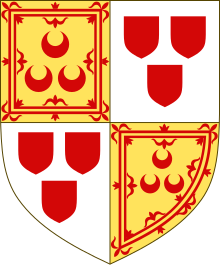British actor (1909–1969)
Sir Bruce Lovat Seton, 11th Baronet (29 May 1909 – 28 September 1969) was a British actor and soldier.[1] He is best remembered for his eponymous lead role in Fabian of the Yard.
Early life
Bruce Lovat Seton was born in Simla, British India, the younger of two sons of Lieutenant-Colonel Sir Bruce Gordon Seton of Abercorn (1868–1934), 9th Baronet and his wife, Elma Armstrong (died 1960).[2] He was educated at Edinburgh Academy and then trained at the Royal Military College, Sandhurst.
Military career
Seton was commissioned into the Black Watch in 1929 as a second lieutenant, but resigned his commission in 1932. A brief interruption in his acting career came during the Second World War and in November 1939 he held the rank of captain in the 10th Battalion, Cameronians (Scottish Rifles), ending the war as major (temporary). His service number was 44304 and he was awarded the Medal of Freedom.[3][4][5]
Acting
Seton began his acting career in the chorus line at Drury Lane Theatre[3] and starred in Ralph Ince's film Blue Smoke (1935) as Don Chinko.[6]
He played Inspector Fabian of Scotland Yard in the television series Fabian of the Yard (1954–1956). The series was based on the career of the former Scotland Yard Detective Inspector Robert Fabian, who usually appeared briefly before the final fade-out to wind up the story.[7]
Seton's last role was as the voice of Beadle in The Wonderful World of Disney (1962–1963).[8]
He fenced and boxed in the Army and was a founder member with other actors of the Lord's Taverners, a charity which raises funds to support participation in cricket.[3]
Later career
In 1963, on 7 February, the death of his brother, Alexander "Sandy" Hay Seton (who had no male heirs), Bruce became the 11th Seton baronet. As Bruce also had no male heirs at the time of his death, in 1969, the title passed to his cousin, Christopher Bruce Seton (1909–1988).[9] His address in the 1940s was 15 Learmonth Gardens in western Edinburgh.[10]
Personal life
He met fellow actor Tamara Desni Willhelm (1911–2008) on the set of Blue Smoke in 1935, became her second husband in 1937 in London and divorced in 1940.[11][12][3]
He married his second wife, actress Antoinette Cellier (born Florence Antoinette Glossop Cellier). They had a daughter, Lydia Antoinette Gordon Seton (born 14 November 1941).[citation needed]
Selected filmography
Honours
Arms
Coat of arms of Bruce Seton

|
|
Sources
References
External links